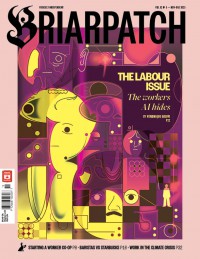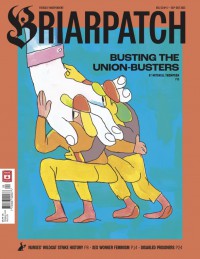-
 Magazine
MagazineSelling the farm
If Harper has his way, CETA – the biggest trade deal since NAFTA – will be finalized by the end of this year. The agreement has largely escaped the attention of the media and food activists, but if gone unchallenged will deal a heavy blow to food sovereignty in this country.
-
 Magazine
MagazineIn defence of the Canadian Wheat Board
Agriculture Minister Gerry Ritz and Prime Minister Stephen Harper have declared they will end the Canadian Wheat Board single desk in August 2012. Recklessly turning the clock back a hundred years, this move will leave farmers at the hands of the robber barons of the grain trade who are already more powerful than ever before.
-
_300_300_90_s_c1.jpg) Magazine
MagazineTurning the tide
The Conservatives won a majority in the recent federal election with a very simple core message. On the basis of their economic agenda and tough-on-crime program, Stephen Harper presented his party as the safe choice in difficult times.
-
 Magazine
MagazineLetter from the editor: a “curse of wealth” and a new leaf
If Chicken Little had gotten her wings on Colonel Sanders’ business plan back in 1955, she would probably have felt the same way Saskatchewan environmentalists did when they read Fortune Magazine’s chops-licking article about their province last month.
-
 Magazine
MagazineLetter from the editor
The Harper Government’s performance at the UN climate change conference in Bali in December certainly didn’t make this country any friends. Alongside Japan and the U.S., our official delegation—which, unprecedentedly, did not include NGOs or opposition politicians—did its utmost to scuttle the world’s last, best hope for averting extreme climate change, and only bowed to global consensus on a watered-down agreement in the face of concerted domestic and international pressure.
-
 Magazine
MagazineWarlords to the left of me, druglords to the right
Malalai Joya, 29, is a popular women’s rights activist and an outspoken critic of the government of Hamid Karzai and the Northern Alliance.
-
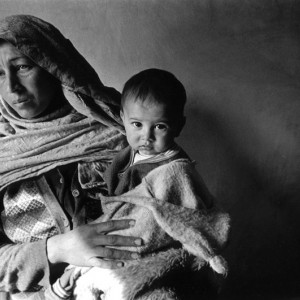 Magazine
MagazineWhat progress for Afghan women?
Today Afghan women are ranked by Human Rights Watch as “among the world’s worst off” by most indicators of social, economic, and political status. What happened? And has the U.S. invasion and NATO occupation improved the situation, or made it worse?
-
 Magazine
Magazine“Any Indian woman marrying any other than an Indian, shall cease to be Indian.”
In June 2007, following generations of non-recognition, and 16 years of intensely personal battles with bureaucrats, governments, and the justice system, Sharon McIvor, a member of the Lower Nicola First Nation, successfully challenged sex discrimination in the Indian Act in British Columbia’s Supreme Court.
-
 Magazine
MagazineSeizing the advantage
In a landmark ruling on June 8 of this year, the Supreme Court of Canada ruled that the Charter of Rights and Freedoms constitutionally protects collective bargaining as part of its guarantee of freedom of association.
One group that has long been struggling against the denial of its freedom of association rights is Ontario’s part-time college workers—and our struggle could serve as a model for other workers in similar circumstances. -
 Magazine
Magazine‘Each day of our lives is dedicated to surviving’
The province of Québec is in the midst of a major swing to the right, as the results of the March 2007 provincial election indicate. The centre-right Liberals of Jean Charest managed to hold on to power with a minority government, and the right-wing Action Démocratique du Québec (ADQ) made significant gains to form the official opposition. While student, labour, and environmental groups are bracing themselves for the anticipated cutbacks, welfare recipients—already reeling from more than a decade of frozen benefits—are wondering how much harder they can be squeezed.
-
 Magazine
MagazineBuilding ‘The World’s Most Flexible Workforce’
Since coming to power, the Harper Conservatives have moved aggressively to expand Canada’s Foreign Worker Program, making it increasingly easy for employers to import workers from abroad. In this first segment of our special report on Canada’s invisible workforce, Karl Flecker investigates the impact on workplace rights in Canada, and how the labour movement is responding.
-
 Magazine
MagazineWorking for a ban
Over 40 countries have banned the use of asbestos—a known and dangerous carcinogen. So why does Canada continue to oppose a ban? And where does the labour movement stand on the question?
-
 Magazine
MagazineEnough to live on
Precarious work is on the rise in Canada. Although the quantity of jobs has increased, often dramatically, during recent years of economic boom, there has also been a strong tendency for full-time, relatively well-paid jobs with benefits and security of tenure to be replaced by part-time, short-term, insecure jobs that pay low wages and provide no employment-related benefits. As a result, the level of economic insecurity of most individuals and households in Canada has increased significantly over the last several years.
-
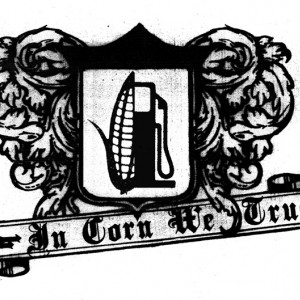 Magazine
MagazineBursting the ethanol bubble
Ethanol’s environmental credentials are dubious at best. Governments everywhere have managed to ignore this mounting evidence. Instead, they have piled aboard the ethanol bandwagon, plowing significant amounts of taxpayer dollars into the production of ethanol and other “biofuels,” claiming this will help both the environment and farmers’ net incomes.
-
 Magazine
MagazineJustice denied
Who is in jail in today’s Haiti, it seems, has a lot more to do with stifling political dissent than with bringing criminals to justice. And Canada has played a key role
-
 Magazine
MagazineStatus of Women vs. the status quo
While particular communities will be injured by the Harper government’s actions, it is ultimately democracy itself that is hurt.
-
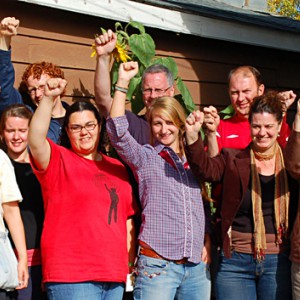 Magazine
MagazineLetter from the editor
When your intention is to challenge the status quo and provoke debate and discussion, you’re likely to ruffle some feathers now and then—and not always those of the people you set out to unsettle.
-
 Magazine
MagazineThe Great War for Civilization: the conquest of the Middle East
Book review of Robert Fisk’s The Great War for Civilization:the conquest of the Middle East

